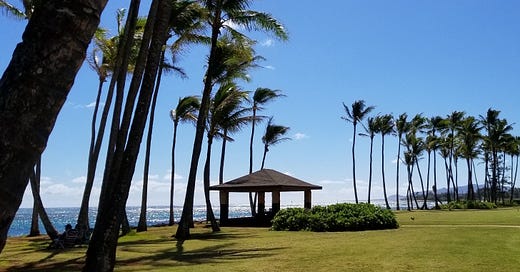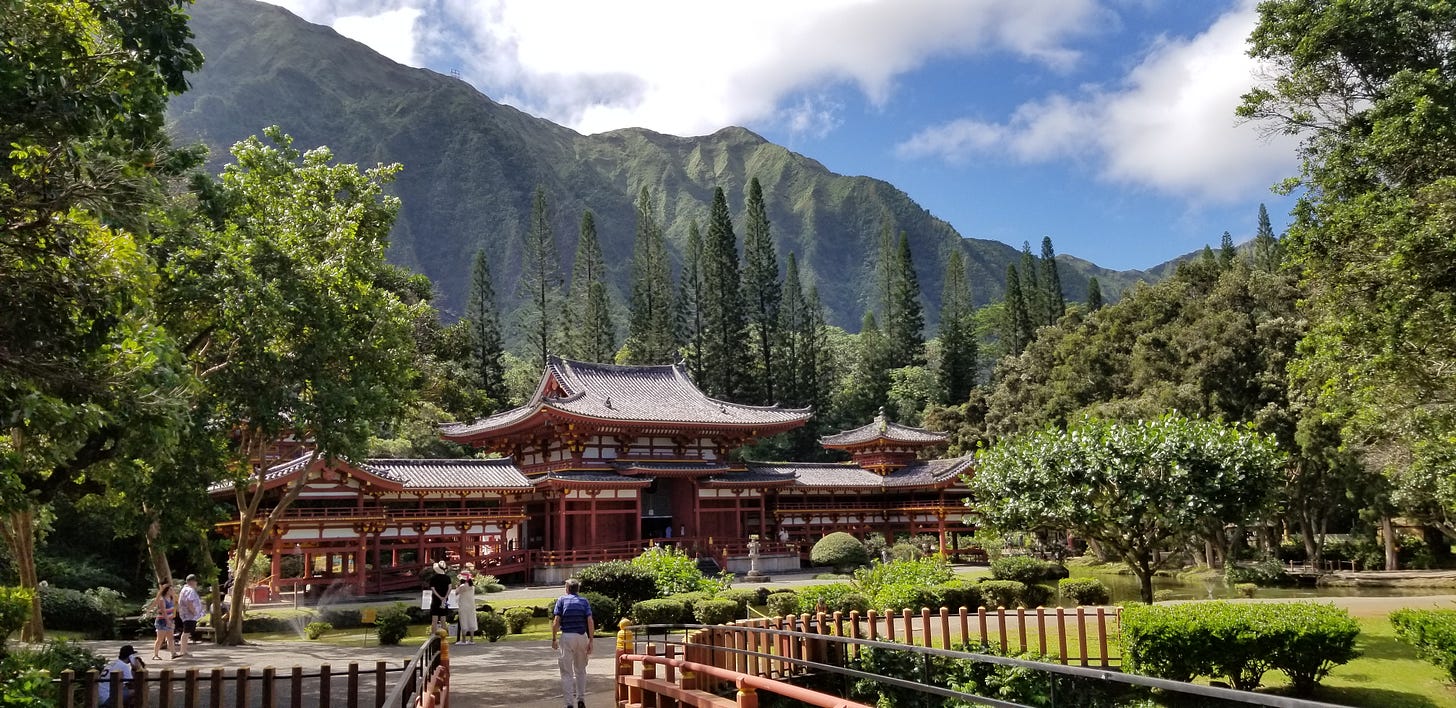Bob and I just got back from Hawaii. In fact, it was 40 hours, four loads of laundry, two trips to the grocery store, and 186 unanswered emails ago. We’re still getting used to the 65-degree difference in temperature and the monochromatic view out our windows, but it’s always good to be home.
Travel typically opens up a new space inside to something unexpected. True to form, this trip to Hawaii—part writers’ conference, part vacation—gave me a new way of thinking about, of all things, war and peace.
This happened not just because we toured the Battleship Missouri at Pearl Harbor and stood on the spot where World War II came to a close after more than 50 million people had died.
It happened because we visited the spectacular Bishop Museum, where we learned how mosquitoes were introduced to the Hawaiian islands.
According to our museum docent, the story may be part legend, but much of it is fact. I hesitate to write about another culture’s history, especially when dates and facts sometimes don’t jive, and I apologize in advance for the over-simplification of this story. In essence, this is what we learned:
Native Hawaiians worshipped four gods, including Lono, the god of peace, and Ku, the god of war. In honor of Lono, the months from October to February were known as Makahiki, the season of peace.
During this time, war was taboo. (And so, by the way, were politics.)
Captain Cook first arrived on the island of Oahu in 1779 during Makahiki and was treated like a god. In fact, islanders believed he might be one, since he and his crew arrived in ships with sails that resembled their symbol for Lono. In any event, they treated Cook and his crew with all the hospitality and generosity of Makahiki, gifting him with a spectacular cape of red and yellow feathers that’s on display at the museum today.
Within a few weeks, though, relations became strained between Cook’s crew and the islanders. Cook and his fleet sailed on, ran into rough seas, and returned to the island a week later.
The season of peace was over, and it didn’t take long for the crewmen and the Hawaiians to find reasons for battle. Cook, in fact, was killed by an angry mob after a Hawaiian chief was shot and killed.
According to the docent, Cook’s crewmen retaliated by picking up a barrel of water infested with mosquito larvae and dumping it in the river. Other sources show an incident with weaponized water occurring in the early 1800s. But either way, it seems commonly accepted that anger and retribution introduced mosquitoes to Hawaii.
And because the insects carry avian diseases, more than half the native species of birds in Hawaii have been wiped out by mosquitoes.
More than half the native bird species in Hawaii. More than 50 million people during World War II. This is what happens in seasons of war.
I’ve been around long enough to know that war and peace take place internally every day. I can wage battle against myself or someone else full force in my mind before, finally, I call a truce, and Makahiki reigns again.
My travels with Bob to Hawaii were no exception. For instance…
A moment looking out over the blue water together. Peace.
Bob complaining that I put too much catsup on our breakfast potatoes at the airport. War.
Meeting some of my favorite mentees in person for the first time at the writers’ conference. Peace.
Calling every rental car company at the Honolulu airport to find out which one had our booking, since we’d left all the paperwork at home and couldn’t find any confirmation emails. War.
Visiting the Byodo-In Buddhist Temple on Oahu. Peace.
Trying to follow Google’s muffed driving directions on the freeway in Honolulu in rush hour traffic. War. (If I’d had a barrel of mosquito-infested water, part of me would have loved to drown my phone in it.)
All of these internal conflicts seem so minor, but I know the little things count. They’re a breeding ground for bigger ones unless I choose a season of peace. That season may be 30 seconds rather than four months. But it’s something. So I try to choose it over and over.
Imagine all the things that we might resurrect or enjoy for the first time if we expanded our seasons of peace and cut way back on our seasons of war. Civility would be one. Honoring humanity over party affiliation could be another. Listening. Enjoying the view out the window wherever you are.
We can’t change the impact of one angry act hundreds of years ago and bring back all the bird species lost to those mosquitoes. Or the lives lost during World War II. But thankfully, acts of peace have long-term consequences, too.
So, for this holiday season, I’m feeling inspired to practice an internal Makahiki as much as I can. From now to February (and beyond), I'm choosing hospitality and an aloha spirit. And then, when war creeps into my mind, which I know it will, choosing peace again.
I hope to renew Makahiki over and over, one moment at a time, with a deep mahalo for this and all the many, many gifts of Hawaii.
May you have a season of peace with your friends and family this week of Thanksgiving. I’m sending love and blessings from Madison County.
Please support my colleagues at the Iowa Writers Collaborative. I recommend their pages!







We just got home from Kona this morning. I had no idea about the mosquitoes! I also didn’t know about Lono and Ku and the season for peace and the season for war. That is very Polynesian! The Aloha Spirit is strong in Kona. Thank you for urging all of us to grab that concept and take the time to enjoy the moments - no matter what they are. That way of thinking is the backbone of the Aloha Spirit. We could put that to very good use in Iowa these days 😉.